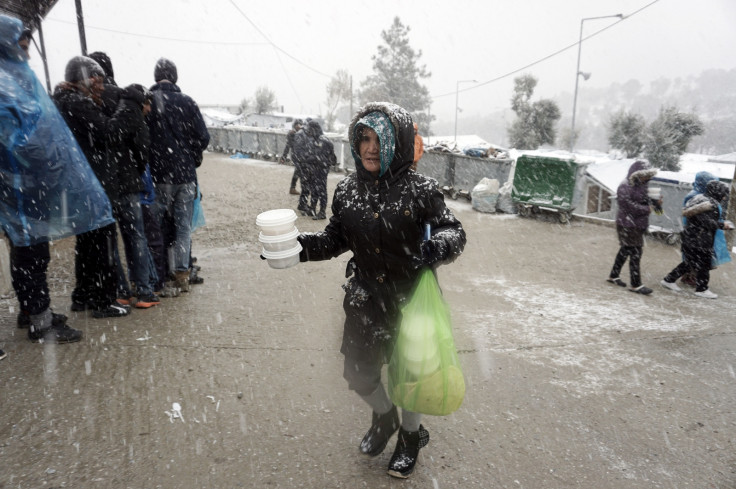'Dogs have a better life': Four refugees die in one week in freezing conditions at Greek camp
A bitter winter is taking refugee lives at the Moria camp on the Greek island of Lesbos.

A string of four deaths in one week at a refugee camp on the Greek island of Lesbos has sparked concern about the conditions in the camps, as Greece experiences its coldest winter in more than a decade.
Three men are known to have died in the Moria camp in the last week, but a Syrian refugee living in the camp – who wished to remain anonymous – told IBTimes UK that there had been a fourth death.
The three refugees who died include a 20-year-old from Pakistan, a 22-year-old Egyptian and a Syrian man aged 46. According to Greek media, the men inhaled fumes from a heater while trying to keep warm, but this has not been confirmed by the authorities. The nationality and cause of death of the fourth man is not yet known.
The unnamed refugee said he had been living in the camp for four months, during which the conditions have become increasingly difficult over the extremely cold winter months.
"The first man who died was from Egypt then the second was from Syria," he said. "They found them in the tent because they were cold. The third one was from Pakistan. They carried him and his face was blue. Later, they brought another man. They took him inside."
He added: "There are too many children and families inside. There is no food for them. The dogs have a better life."
Reuters reported the Greek migration minister Yiannnis Mouzalas has ordered an investigation into the deaths to determine the causes.
Speaking to IBTimes UK, another migrant living in Moria said the conditions were dangerous. "The water is no good, the showers no good, the toilets are no good in Moria," said the 20-year-old man from Afghanistan, who asked to remain anonymous.
He added that the conditions were such that he had occasionally left the camp to take shelter with several other men in a nearby squat. "For women, it is very bad, for children, it is very bad – because it is so cold," he said. "People have been killed because it is really cold inside the tents."
At least 3,000 refugees and migrants are living in freezing conditions in Moria, an overcrowded former army base. Charities and aid organisations have been rushing to delivered food, blankets and warm clothing to the camps.
More than 180,000 refugees and migrants reached Greece in 2016, according to the United Nations.
"We have repeatedly warned about the miserable living conditions for refugees and migrants," said Roland Schönbauer, spokesperson for the UNHCR.
"Seeing that the government-run camp Moria would not be made fit for winter in time, back in November, we discussed options with the authorities how we could step in.
"So we were allowed to put up four heated rub halls as an emergency response, and we are trying to help the authorities with shelter improvements. In addition, we helped get over 600 people out of Moria, particularly vulnerable persons and families with children, to accommodate them in our residential containers in the municipality-run camp Karatepe (200 people) and in private places.
"The snow was only the tip of the iceberg, the underlying problem is the overcrowding due to marathon-long procedures. Greek authorities with the support from European asylum experts need to shift the gear to allow more asylum-seekers to mainland Greece where better accommodation is available."
© Copyright IBTimes 2025. All rights reserved.






















